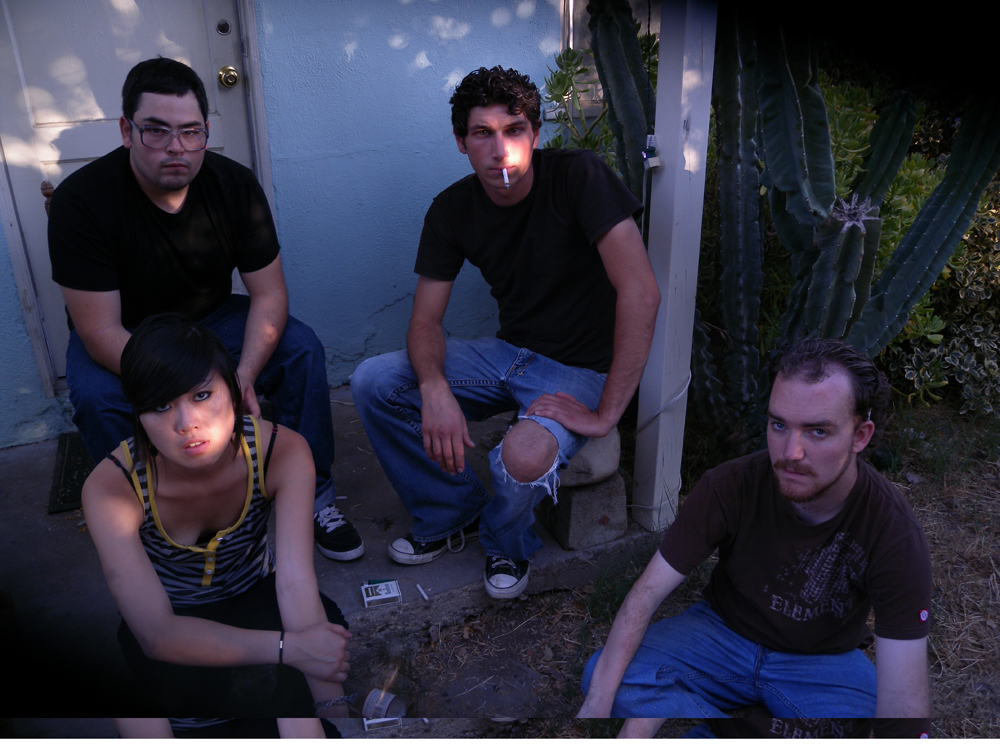By Chlotrudis Independent Film Society
Rating: 5 cats
Director: Mike Ott
Starring: Atsuko Okatsuka | Cory Zacharia | Rintaro Sawamoto | Roberto 'Sanz' Sanchez

Country: united_states
Year: 2011
Running time: 83
IMDB: http://www.imdb.com/title/tt1608285/
Jason says: “I wonder and worry a bit about how LITTLEROCK will play outside the festival circuit. It’s a wonderful little film, but it would be easy for a well-meaning distributor to drastically change the experience. Of course, I’m also kind of curious as to what it might be like to see it after that Japanese language class I’ve been meaning to take – or hear how it plays in Japan, with the subtitling situation reversed.
“Littlerock, California, is basically a wide spot in the road; Rintaro Sakamoto (Rintaro Sawamoto) and his sister Atsuko (Atsuko Okatsuka) wind up there after their rental car breaks down, with the next bus to San Francisco a couple days away. There’s a party going on in the next room, and that’s where they meet Cory Lawler (Cory Zacharia), a local with dreams of being a model. He’s quickly infatuated with Atsuko, despite the fact that they need her brother to translate for them. When the bus comes, Atusko tells Rintaro that she wants to stay, crashing inn Cory’s father’s spare bedroom and helping out at the family business – and being rather more interested in Jordan (Brett Tinnes) than Cory – until Rintaro returns so that they can make the last leg of their trip before going home together.
“Subtitles are generally a part of the movie-watching experience that most don’t give a lot of thought to, other than their blanket presence or absence, but co-writer/director Mike Ott deploys them very carefully here; with few exceptions, they only appear when Atsuko and Rintaro are talking to each other or Atsuko is writing a letter to her father – that is, when her words are going to be understood. When Atsuko is with Cory or Jordan, what she says is left untranslated. The height of this is during a scene behind the Lawler burrito shop, when Atsuko, Cory, and cook Francisco (Roberto Sanchez) are each speaking a different language. And yet, the scene isn’t confusing at all – though we may not understand two-thirds of the words used, we get the gist of what Atsuko and Francisco are saying through tone and body language, and more importantly, we get that they can follow each other, even though Cory seems almost willfully obtuse.
“And that, in a lot of ways, tells us what we need to know about those two main characters and the performances bringing them to life. Atsuko Okatsuka’s performance may be reserved to some; her namesake is a ‘watch the eyes, not the mouth’ sort of person. Still, she’s expressive that way; you can see how how she lights up around Jordan and basically tolerates Cory, along with her quiet excitement at being on her own. We’re told very little about Atsuko, but the important parts of her life until now make themselves fairly clear. Both as an actress and as one of the credited writers (cinematographer Carl McLaughlin is the other), she uses silence well – we get that she recognizes the futility of trying to communicate verbally, so she’s just going to plow ahead, even it seems more selfish than pragmatic at points.
“Selfish is a word that can be used to describe Cory without being terribly uncharitable; Zacharia continuously nails the sort of delusion that his character constantly seems to labor under. As soon as he sees Atsuko, he’s got the narrative all worked out in his head and seems annoyed when she starts deviating from it. He’s a sad, pitiable case, but Zacharia manages to walk the fine line between his being aware of how he doesn’t fit into this town and not being aware that this doesn’t necessarily make him better than it; he also makes even an unwanted infatuation more sweet then creepy.
“Those two are at the heart of the film, but everything and everyone around them works too. Ott and McLaughlin don’t overplay this town as being beautiful or appealing, but they do find an impressive and inspiring starkness to it that gets put to good use. The script is similarly lean, giving us moments of contemplation and everyday life made alien before a last act that calls back to the beginning, a reference that will mean something to some of the audience right away and the rest at the end.
“And, indeed, that finale adds a sublime extra layer to LITTLEROCK; what had previously been an impressive movie about self-discovery and communication quietly invites the audience to ponder what might have been otherwise. It’s an idea that may not start resonating until after the film ends, but which certainly should stick with the audience well afterward, and what more could a movie aspire to? 5 cats
“Seen 1 May 2011 in Somerville Theatre #3 (IFFBoston 2011)
Michael says: “I loved LITTLEROCK! A really wonderful film that starts about being about how relationships develop without communication, but turns into something much different touching upon what it means to be American, and how your origins define your outlook on life. Atsuko Okatsuko, who plays the lead character, is wonderful as a young Japanese woman who finds herself momentarily stuck in a little California town with her brother. She speaks no English, and her brother speaks a little. They start to hang around with some of the natives, and when her brother moves on to San Francisco, she decides to stay. Director Mike Ott has a light touch and a keen eye. Atsuko also gets a screenplay credit as well, and it all works beautifully in this extremely low-budget tale that is moving, illuminating and a little sad all at once. A wonderful contender for the Buried Treasure award. Screener is available for Chlotrudis members, and it’s also available for sale (although not yet through Amazon.) 5 cats”
